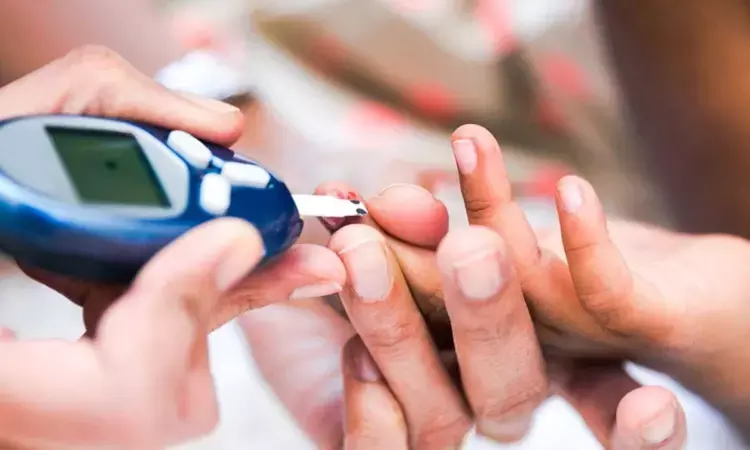- Home
- Medical news & Guidelines
- Anesthesiology
- Cardiology and CTVS
- Critical Care
- Dentistry
- Dermatology
- Diabetes and Endocrinology
- ENT
- Gastroenterology
- Medicine
- Nephrology
- Neurology
- Obstretics-Gynaecology
- Oncology
- Ophthalmology
- Orthopaedics
- Pediatrics-Neonatology
- Psychiatry
- Pulmonology
- Radiology
- Surgery
- Urology
- Laboratory Medicine
- Diet
- Nursing
- Paramedical
- Physiotherapy
- Health news
- Fact Check
- Bone Health Fact Check
- Brain Health Fact Check
- Cancer Related Fact Check
- Child Care Fact Check
- Dental and oral health fact check
- Diabetes and metabolic health fact check
- Diet and Nutrition Fact Check
- Eye and ENT Care Fact Check
- Fitness fact check
- Gut health fact check
- Heart health fact check
- Kidney health fact check
- Medical education fact check
- Men's health fact check
- Respiratory fact check
- Skin and hair care fact check
- Vaccine and Immunization fact check
- Women's health fact check
- AYUSH
- State News
- Andaman and Nicobar Islands
- Andhra Pradesh
- Arunachal Pradesh
- Assam
- Bihar
- Chandigarh
- Chattisgarh
- Dadra and Nagar Haveli
- Daman and Diu
- Delhi
- Goa
- Gujarat
- Haryana
- Himachal Pradesh
- Jammu & Kashmir
- Jharkhand
- Karnataka
- Kerala
- Ladakh
- Lakshadweep
- Madhya Pradesh
- Maharashtra
- Manipur
- Meghalaya
- Mizoram
- Nagaland
- Odisha
- Puducherry
- Punjab
- Rajasthan
- Sikkim
- Tamil Nadu
- Telangana
- Tripura
- Uttar Pradesh
- Uttrakhand
- West Bengal
- Medical Education
- Industry
Ipragliflozin treatment improves blood sugar control avoiding ketoacidosis in patients with type 1 diabetes

Japan: Ipragliflozin treatment for type 1 diabetes (T1D) may help improve glycaemic control/variability while avoiding ketoacidosis, according to findings from a multicentre, open-label, prospective study published in Diabetes, Obesity and Metabolism.
The study stated that using SGLT2 inhibitor ipragliflozin for T1D increased postprandial glucagon secretion, which did not exacerbate postprandial hyperglycaemia but might protect against hypoglycaemia, leading to reduced glycaemic variability. The increased secretion of glucagon might accelerate ketogenesis when adequate insulin is not supplied.
Intensive insulin therapy remains the mainstay treatment for T1D, including multiple daily injections with different formulations and insulin pumps. However, intensive insulin therapy can raise the risks of weight gain and hypoglycaemia. Recent advances in insulin formulations, continuous glucose monitoring (CGM) systems, and insulin delivery systems have helped improve glycemic control in T1D patients. However, it is still difficult to keep glucose levels within the normal range without increasing the risks of weight gain and hypoglycaemia even when these new technologies are used. So, there is a demand for additional therapies to supplement insulin treatment that can achieve optimal glycaemic control for patients with T1D.
Clinical trials have shown the efficacy of sodium-glucose cotransporter 2 inhibitors for type 1 diabetes by significant reductions in glycemic variability and body weight, but elevated susceptibility to ketoacidosis via elevated glucagon secretion was a potential concern.
The Suglat-AID evaluated glucagon responses and their associations with glycaemic control and ketogenesis before and after type 1 diabetes treatment with the sodium-glucose cotransporter 2 inhibitor, ipragliflozin.
Yuta Nakamura, Nagasaki University Graduate School of Biomedical Sciences, Nagasaki, Japan, and colleagues included adults with type 1 diabetes (n=25) who took 50-mg open-labelled ipragliflozin daily as adjunctive to insulin. Clinical/laboratory data, including continuous glucose monitoring, were collected until 12 weeks following the ipragliflozin initiation.
The participants underwent a mixed-meal tolerance test (MMTT) twice [before (first MMTT) and 12 weeks after ipragliflozin treatment (second MMTT)] to evaluate responses of glucose, glucagon, C-peptide, and β-hydroxybutyrate.
The study led to the following findings:
- The area under the curve from fasting (0 min) to 120 min (AUC0-120min) of glucagon in the second MMTT was significantly increased by 14% versus the first MMTT.
- The fasting and postprandial β-hydroxybutyrate levels were significantly elevated in the second MMTT versus the first MMTT.
- The positive correlation between postprandial glucagon secretion and glucose excursions observed in the first MMTT disappeared in the second MMTT, but a negative correlation between fasting glucagon and time below range (glucose, <3.9 mmol/L) appeared in the second MMTT.
- The percentage changes in glucagon levels (fasting and AUC0-120min) from baseline to 12 weeks were significantly correlated with those in β-hydroxybutyrate levels.
The study showed that an adjunctive treatment of ipragliflozin in type 1 diabetes patients increased postprandial glucagon secretion but improved postprandial hyperglycaemia with a decrease in glycaemic variability. The increased secretion of glucagon might contribute to reduction of glycemic variability and hypoglycaemia without causing postprandial hyperglycaemia.
The elevated postprandial glucagon might indirectly or directly affect ketone production under the condition of insulin insufficiency.
"Our findings may support the proper use of ipragliflozin to improve glycaemic variability/control and avoid ketoacidosis in patients with T1D," they concluded.
Reference:
Nakamura Y, Horie I, Kitamura T, Kusunoki Y, Nishida K, Yamamoto A, Hirota Y, Fukui T, Maeda Y, Minami M, Matsui T, Kawakami A, Abiru N. Glucagon secretion and its association with glycaemic control and ketogenesis during sodium-glucose cotransporter 2 inhibition by ipragliflozin in people with type 1 diabetes: Results from the multicentre, open-label, prospective study. Diabetes Obes Metab. 2024 Jan 22. doi: 10.1111/dom.15458. Epub ahead of print. PMID: 38253809.
Dr Kamal Kant Kohli-MBBS, DTCD- a chest specialist with more than 30 years of practice and a flair for writing clinical articles, Dr Kamal Kant Kohli joined Medical Dialogues as a Chief Editor of Medical News. Besides writing articles, as an editor, he proofreads and verifies all the medical content published on Medical Dialogues including those coming from journals, studies,medical conferences,guidelines etc. Email: drkohli@medicaldialogues.in. Contact no. 011-43720751


